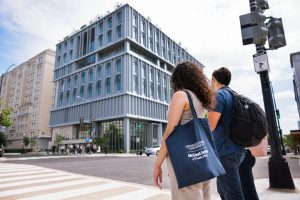The Georgetown University McCourt School of Public Policy is launching a revised executive master of policy leadership (EMPL) program, a degree program that integrates economics and political science with public policy and administration, for the Summer 2025 semester.
This 30-credit program, now a 15-month program for experienced professionals moving into policy leadership roles, equips the professionals with skills for effective policymaking and strategic management. The EMPL program is tailored for professionals new to the policy field without a formal background in policy.
Leslie Evertz, director of strategic initiatives at McCourt, said the program recognized it had been more focused on leadership than on developing the practical skills students needed.
“When we became an open enrollment program, we thought we would be recruiting senior executive service members from the federal government, but what we realized fairly quickly was that there is a lot of competition for that market and that we weren’t really teaching the skills that people were looking for,” Evertz told The Hoya. “We focused a lot more on leadership and not so much on the policymaking and policy implementation part of it.”
Evertz said that, unlike the previous version, the redeveloped program will now fall under executive education.
“Now they have a full-time faculty director, they have all of the support of our student affairs team, the students will be much more engaged and linked to the McCourt community and we’ll do more events and programming to connect them to the community,” Evertz said. “For the curriculum part of it, we are focusing on bringing in people to talk and teaching them on the skills and language of policymaking.”

Judith Feder, professor at McCourt who teaches “Politics of Policymaking” as well as courses on health and entitlements policies, said she was excited to incorporate experiential learning into her classes.
“I’m excited to bring my experience and expertise to leaders in this program,” Feder wrote to The Hoya. “I look forward to learning with and from our EMPL class — engaging in a variety of simulations (briefings, decision-processes, debates) and in direct exchanges with experienced political professionals currently striving to influence policy.”
Evertz said the program integrates classroom theory with practical experience, ensuring graduates can apply their knowledge to drive meaningful change in their organizations.
“It is going to be very focused on experiential learning, so lots of guest speakers, case studies, simulations, getting the students out into the community and meeting with high-level practitioners,” Evertz said. “The curriculum is very focused on the quantitative and economic skills they need to know.”
Evertz also said the program transitioned to full-time faculty to foster a more close-knit community at McCourt.
“In our first iteration, we mostly had adjunct faculty teaching, and while they were wonderful, they weren’t as connected to the McCourt and Georgetown community,” Evertz said. “Now, at least 20% of the courses are going to be taught by full-time faculty, which we hope will connect all the students and faculty better to the community so they feel like they are part of McCourt.”
Barbara Schone, associate dean for academic affairs at McCourt, said the program aims to create connections among their students.
“Given the work experience of the people that we will attract, we want them to be learning not only from their instructors and the resources in D.C. but also from one another,” Schone wrote to The Hoya.
Evertz said the EMPL program recruits students who need a greater foundation in policymaking and aims to equip them with this essential knowledge.
“We’re looking for people who maybe found themselves in policy roles who haven’t ever studied public policies, people who come from specific industries and now find themselves in policy advocacy roles,” Evertz said. “We also are looking for people who may have risen to roles in public policy who have not yet gotten an advanced degree and are interested in building out those skills and connecting with more people within the policymaking community.”
“We want to work with them to provide them with the understanding and knowledge of policies so that they can better advocate for their specific policies,” Evertz said.
Schone said the program was redesigned to prepare those with limited experience for the policymaking field and future career opportunities.
“Our students may be experts in their industries with less exposure to the policy world in which they are working,” Schone said. “Our intention is to sharpen those skills so that they can lead effective policy changes in their organizations — whether that is in the governmental, non-profit, or for-profit sectors.”